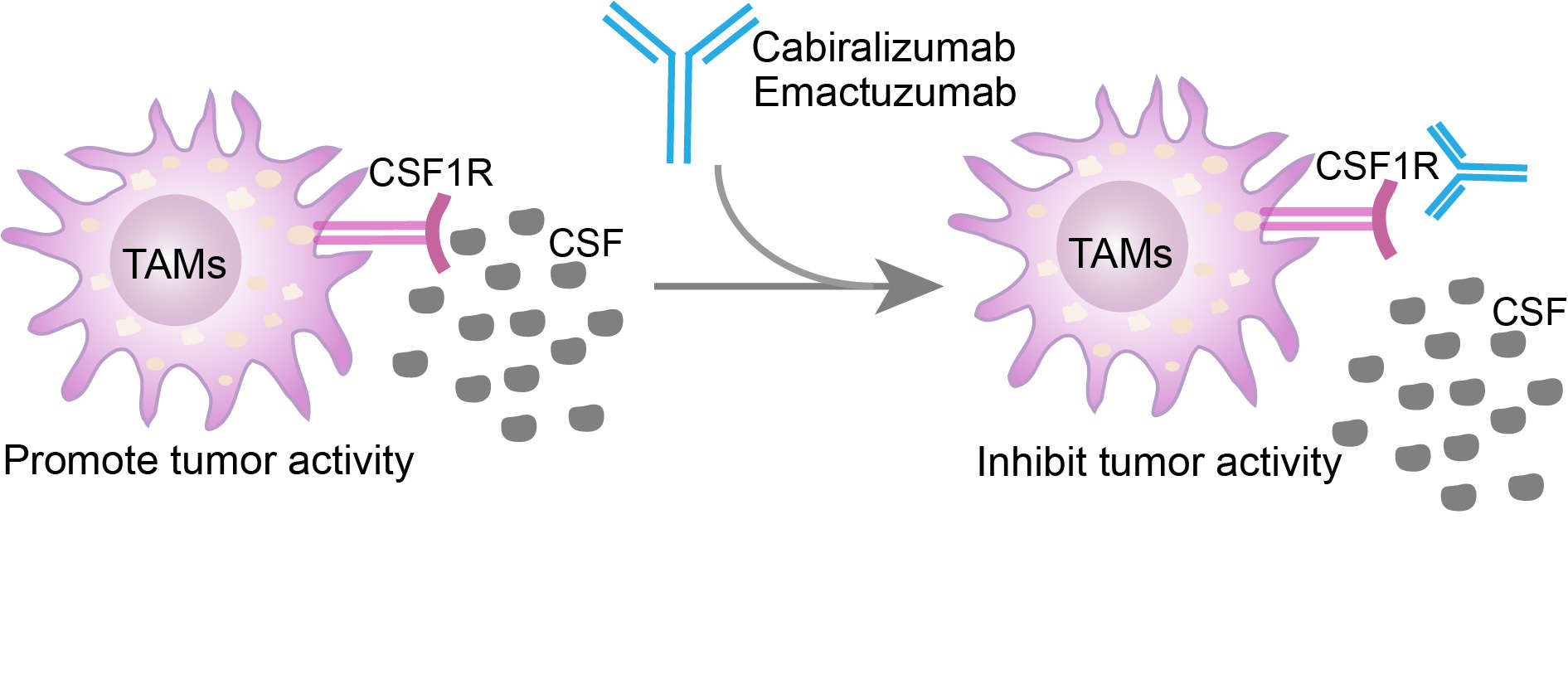

Emactuzumab Overview
Introduction of Emactuzumab
Emactuzumab, also known as RG-7155, is a humanized monoclonal antibody developed by Genentech/Roche. It was designed to directly against the tyrosine kinase receptor colony stimulating factor 1 receptor (CSF1R), which is also known as macrophage colony-stimulating factor receptor (M-CSFR) and Cluster of Differentiation 115 (CD115). Emactuzumab has been investigated in the treatment for the diseases including fallopian tube cancer, ovarian cancer, peritoneal cancer and solid tumors. The trail that emactuzumab combination regimen with selicrelumab (RG7876) in solid tumors is currently in Phase II.
Mechanism of Action of Emactuzumab
CSF-1R, a growth factor receptors, is a member of the receptor protein tyrosine kinase (rPTK) family, which includes several proto-oncogenes and has a critical role in the development and progression of many types of cancer. CSF-1R and its ligand, Colony-stimulating factor 1 (CSF-1), regulate the migration, differentiation, and survival of macrophages and their precursors. CSF-1R is considered as a possible treatment target for cancer or inflammatory diseases because it is overexpressed in many cancers and on tumor-associated macrophages (TAM). Emactuzumab is one of the artificially developed inhibitors that target CSF1R. It is designed to inhibit the survival of tumor-promoting ‘M2’ macrophages mediated by CSF-1 without affecting tumor-killing ‘M1’ macrophages. Binding of emactuzumab to CSF1R blocks the interaction between CSF-1 and CSF1R. This prevents both the activation of CSF1R expressed on macrophages and the signaling transduction mediated by CSF1R in these cells, reducing the production of inflammatory mediators by macrophages. Emactuzumab exerts its anti-tumor function by repressing the activity of CSF1R-dependent tumor-associated macrophages (TAMs), which play important roles in tumor cell proliferation, tumor angiogenesis, invasion and metastasis, immunosuppression, and drug resistance. In addition, emactuzumab blocks the recruitment of TAMs to the tumor microenvironment, leading to the enhancement of T-cell infiltration and antitumor T-cell immune responses and the inhibition of the proliferation of tumor cells.
 Fig. 1 Mechanism of action of Emactuzumab
Fig. 1 Mechanism of action of Emactuzumab
Table 1. Clinical Projects of Emactuzumab*
| NCT ID | Status | Conditions | Lead Sponsor | Update Time |
| NCT02323191 | Active, not recruiting | Solid Cancers | Hoffmann-La Roche | September 27, 2018 |
| NCT02923739 | Active, not recruiting | Malignant Neoplasms of Female Genital Organs | M.D. Anderson Cancer Center | July 30, 2018 |
| NCT03193190 | Recruiting | Pancreatic Adenocarcinoma | Hoffmann-La Roche | August 31, 2018 |
What We Provide
Therapeutic Antibody
Emactuzumab
We provide high-quality Emactuzumab for use in WB, FC, IP, ELISA, Neut, FuncS, IF and most other immunological methods. For lab research use only, not for diagnostic, therapeutic or any in vivo human use.
Reference
* The table was excerpted from the following website
https://clinicaltrials.gov/ct2/results?cond=&term=emactuzumab
For research use only. Not intended for any clinical use.
This site is protected by reCAPTCHA and the Google Privacy Policy and Terms of Service apply.

